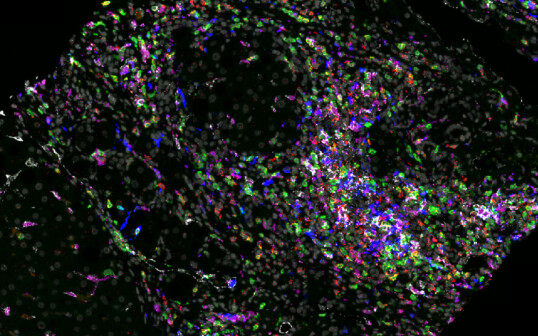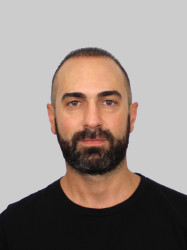Summary
Biography:
Evangelos is Lecturer in Liver Immunology at the Section of Hepatology and Gastroenterology. He obtained a BSc in Biology from the National and Kapodistrian University of Athens, and a MSc in Developmental Biology from the University of Bath. He undertook his PhD in Liver Immunology at King’s College London (Institute of Liver Studies) investigating the mechanisms of immune-mediated injury in acute liver failure, having spent a part of his doctoral work at the University of Birmingham (Centre for Liver and Gastrointestinal Research). In 2017, Evangelos joined Imperial College for his post-doctoral research in immune dysregulation during acute and chronic liver injury, with a special focus on monocyte/macrophage inflammatory and bactericidal functions. He has been awarded funding from the Rosetrees Trust (2017, 2021), Imperial College (ICRF, 2018) and the UKRI Medical Research Council (NIRG, 2022).
Triantafyllou Lab (CWB 10th floor, Hammersmith Campus):
The Triantafyllou Lab investigates the microbial, metabolic, molecular and cellular crosstalk that underlies immune dys-regulation during acute and chronic liver injury. To determine this, we study both human tissue samples and in vivo disease models and employ flow cytometry, intravital imaging, single-cell and spatial omics. Throughout our work, we seek to advance our immunological understanding of liver disease pathogenesis and identify targets for developing immunomodulatory therapeutic approaches.
One part of our research focuses on the dysregulated, and often ineffective, immune response to infection during acute (e.g., paracetamol-ALF) or chronic (cirrhosis, MASLD) liver disease, that contribute to increased morbidity and mortality. Another significant area of interest within the lab is determining the mechanisms through which different checkpoint pathways e.g., PD-(L)1 and TIGIT, control peripheral and hepatic immune responses, at steady state and in liver inflammation, with the aim of exploiting this to produce new immune-directed therapies.

Current research:
- Checkpoint pathway-mediated immune (dys-)regulation
- Immunomodulatory therapeutic approaches
- Deciphering microbiome-pathogen-immune interactions
- Dysregulated lipid metabolism and innate immunity
- TAM receptors and myeloid cell biology
Funding:
UKRI Medical Research Council, Rosetrees Trust, Imperial College London, NIHR Imperial Biomedical Research Centre
Selected Publications
Journal Articles
Trovato FM, Zia R, Artru F, et al., 2023, Lysophosphatidylcholines modulate immunoregulatory checkpoints in peripheral monocytes and are associated with mortality in people with acute liver failure., Journal of Hepatology, Vol:78, ISSN:0168-8278, Pages:558-573
Singanayagam A, Triantafyllou E, 2021, Macrophages in Chronic Liver Failure: Diversity, Plasticity and Therapeutic Targeting, Frontiers in Immunology, Vol:12
Triantafyllou E, Gudd CLC, Mawhin M-A, et al., 2021, PD-1 blockade improves Kupffer cell bacterial clearance in acute liver injury, Journal of Clinical Investigation, Vol:131, ISSN:0021-9738
Triantafyllou E, Pop O, Possamai L, et al., 2017, MerTK expressing hepatic macrophages promote the resolution of inflammation in acute liver failure, Gut, Vol:67, ISSN:1468-3288, Pages:333-347

